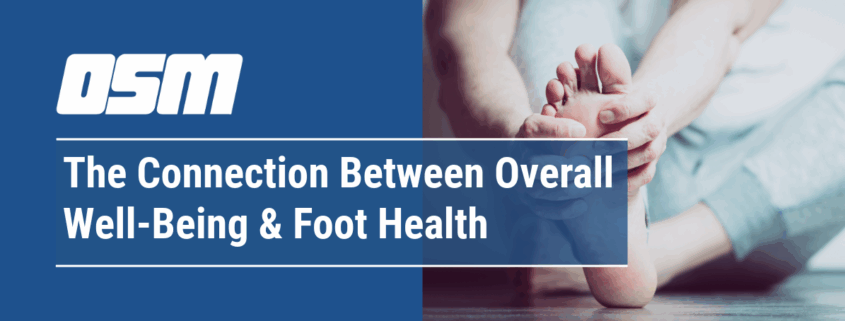The Connection Between Overall Well-Being and Foot Health
Article featured on Central Arkansas Foot & Ankle Specialists
Your feet play a bigger role in your overall health than you might think. From balance and mobility to early indicators of systemic conditions like diabetes or circulatory issues, foot health is directly tied to your overall well-being. Prioritizing regular foot care can lead to better posture, fewer injuries, and even early detection of health problems.
Why Foot Health Matters for Your Entire Body
Your feet support your entire body. When something’s off, such as poor alignment, inflammation, or chronic pain, it can affect everything from your knees and hips to your back and posture.
Key impacts of poor foot health include:
- Reduced mobility and balance
- Increased risk of falls or injury
- Compensatory pain in other joints (like knees, hips, or spine)
The human foot has 26 bones, 33 joints, and over 100 muscles, tendons, and ligaments, all working in harmony to support your movement. Misalignment or damage to any part of this system can trigger a chain reaction of problems throughout the body.
Keeping your feet healthy isn’t just about comfort – it’s essential for physical function and independence, especially as we age.
The Feet as a Window Into Overall Well-Being
Your feet often show early signs of broader health issues. Monitoring them closely can help you spot potential red flags.
Common conditions that show up first in the feet:
- Diabetes: Numbness, slow healing wounds, or infections
- Circulatory disorders: Cold feet, discoloration, or swelling
- Arthritis: Joint stiffness or swelling
- Neuropathy: Burning, tingling, or loss of sensation
Additionally, symptoms like foot cramping could signal vitamin deficiencies, such as magnesium or potassium. Toenail discoloration may indicate fungal infections or underlying skin conditions, and swelling could be linked to heart, liver, or kidney issues.
Routine foot exams can catch these conditions early, improving outcomes and preventing serious complications.
How Foot Pain Disrupts Daily Life
Foot pain doesn’t just hurt – it interrupts your routine, affects your mental health, and lowers your overall quality of life.
Consequences of ignoring foot pain:
- Skipping workouts or walks, reducing cardiovascular health
- Poor sleep due to discomfort
- Increased risk of depression or isolation due to mobility issues
Even minor pain, like that from plantar fasciitis or bunions, can lead to gait changes, which then stress other joints. Long-term, these changes can contribute to chronic musculoskeletal issues that are harder to reverse.
Addressing foot discomfort early can help you stay active, social, and mentally well.
Good Foot Health Supports Mental and Emotional Well-Being
There is a strong mind-body connection when it comes to your feet. Chronic pain or limitations in movement can cause frustration, anxiety, or depression.
Benefits of healthy feet on emotional well-being:
- Increased confidence in mobility
- Better participation in hobbies or social activities
- Reduced stress from physical limitations
Feet also play a role in stress relief. Practices like reflexology or therapeutic foot massage can activate pressure points that relieve tension and improve relaxation – enhancing your emotional well-being and physical recovery.
Maintaining foot health gives you the freedom to live life fully on your terms.
Easy Habits to Improve Foot Health and Overall Well-Being
You don’t have to wait until there’s a problem to take care of your feet. Simple steps can prevent common issues and improve overall wellness.
Daily Foot Care Tips:
- Inspect your feet for blisters, redness, swelling, or cuts.
- Wash and dry thoroughly, especially between toes.
- Moisturize to prevent dryness and cracking.
- Wear supportive footwear that fits properly.
- Stretch and exercise your feet to maintain strength and flexibility.
Additional practices that support long-term foot health:
- Rotate your shoes regularly to avoid overuse wear patterns.
- Use orthotic inserts if you have flat feet or high arches.
- Avoid walking barefoot on hard surfaces for extended periods.
- Elevate your feet after long periods of standing to reduce swelling.
Small changes in your routine can lead to lasting improvements in both foot health and general wellness.
When to See a Foot and Ankle Specialist
Not all foot issues go away on their own. If you’re experiencing persistent symptoms, it may be time to see a podiatrist.
The Orthopedic & Sports Medicine Center of Oregon is an award-winning, board-certified orthopedic group located in downtown Portland Oregon. We utilize both surgical and nonsurgical means to treat musculoskeletal trauma, spine diseases, foot and ankle conditions, sports injuries, degenerative diseases, infections, tumors and congenital disorders.
Our mission is to return our patients back to pain-free mobility and full strength as quickly and painlessly as possible using both surgical and non-surgical orthopedic procedures.
Our expert physicians provide leading-edge, comprehensive care in the diagnosis and treatment of orthopedic conditions, including total joint replacement and sports medicine. We apply the latest state-of-the-art techniques in order to return our patients to their active lifestyle.
If you’re looking for compassionate, expert orthopedic and podiatric surgeons in Portland Oregon, contact OSM today.
Phone:
503-224-8399
Address
17355 Lower Boones Ferry Rd Suite 100A
Lake Oswego, OR 97035
Hours
Monday–Friday
8:00am – 4:30pm



